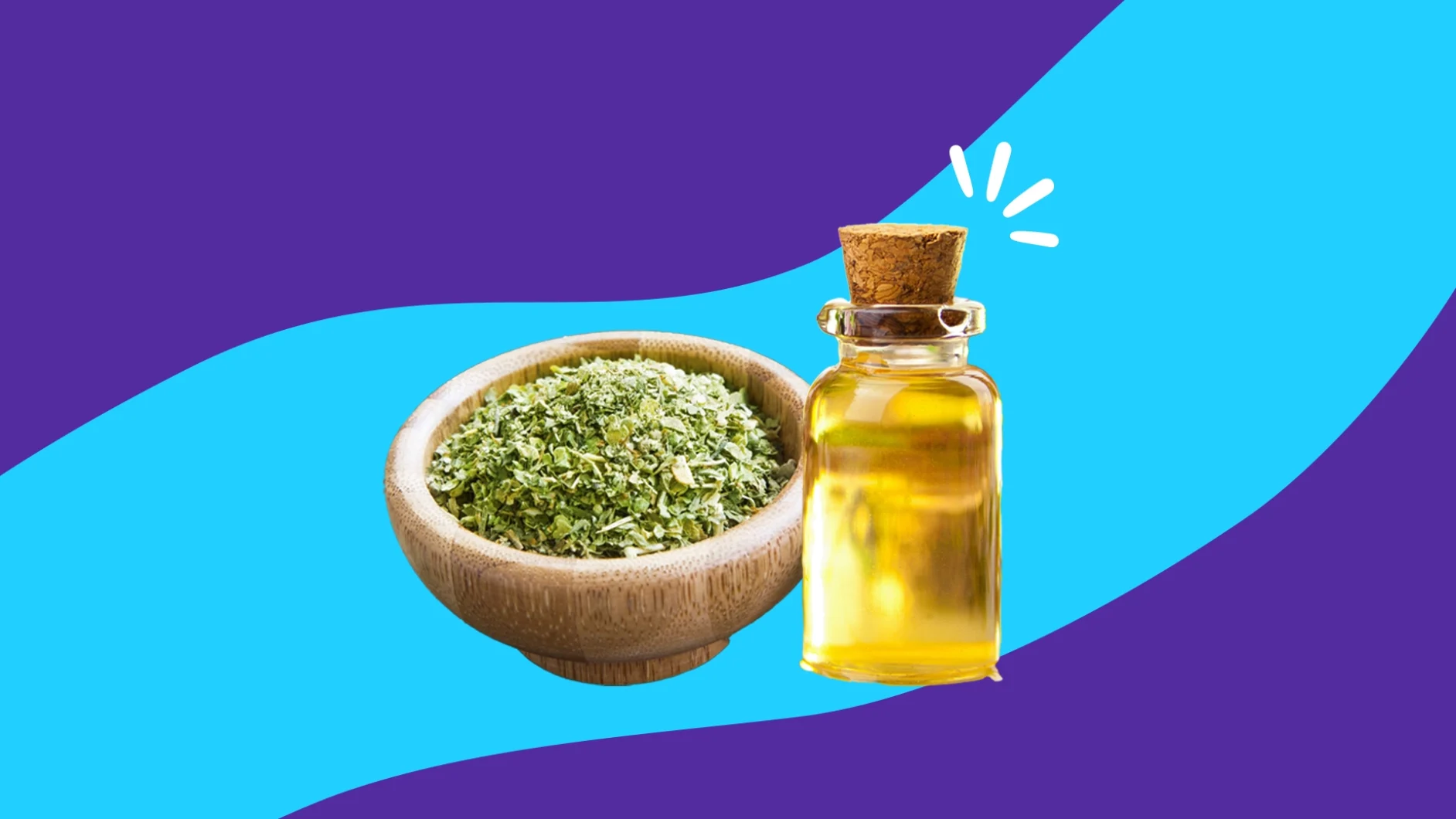Oregano—the tasty seasoning you add to your pasta sauce—and oregano oil come from the same plant, but are different compounds. The spice is the dried herb and ground up. Oil of oregano is an extract of the oregano plant. Studies have found that oil of oregano has many benefits, including improved gut health, a stronger immune system, the ability to fight fungal infections, and more. Keep reading to learn how to safely use the extract and any precautions you need to be aware of if you take this supplement.
What is oregano oil?
There are two types of oregano oil made from oregano plants (origanum vulgare): oregano essential oil and oil of oregano.
Oregano essential oil is made by drying oregano plants, and then using a process called steam distillation (passing steam through the dried plant to obtain concentrated oregano essential oil). The resulting essential oil is mixed with a carrier oil, such as coconut oil or olive oil, and applied topically. You should not consume oregano essential oil orally.
Oil of oregano is extracted with heat, carbon dioxide, or alcohol and can be taken as a supplement in pill or capsule form.
Both forms of oregano oil contain carvacrol, thymol, and rosmarinic acid compounds, which have powerful anti-inflammatory, antibacterial, antioxidant, and antifungal properties. These are thought to be the root of the benefits of oregano oil.
8 health benefits of oregano oil
Oregano oil has been used in traditional cultures for centuries as a cure for many types of conditions, including respiratory issues, indigestion, and even rheumatoid arthritis. Here are eight potential benefits of oregano oil, according to modern research.
1. Treat gastrointestinal infections
Oregano oil is good for your gut and may even help treat certain gut infections, says Yelena Wheeler, MPH, a registered dietitian nutritionist at the National Coalition on Health Care (NCHC). “It has antibiotic qualities due to one of its phenols,” says Wheeler. This may reduce the growth of certain bacteria, such as E. coli she explains. Additionally, there’s some research showing that essential oils like oregano oil can improve symptoms of small intestinal bacterial overgrowth (SIBO), which is characterized by an overpopulation of bacteria in the gut.
2. Improve gut health
Research shows that oregano oil has an overall positive impact on your gut health. Specifically, phytochemicals found in oregano oil protect against gastrointestinal inflammation. However, this study was on animal subjects. More research is needed to determine if the benefits translate to humans.
3. Boost immune health
There’s some evidence that oregano can support and improve your immune system. “Oregano is known for its antibacterial and antimicrobial properties to fight off various harmful bacteria and microbes,” explains Chrissy Arsenault, RD, a nutrition expert based in Indianapolis, Indiana. “Through these properties, it may help give your immune system a little boost.” Research backs this up as well—a 2017 study found that oregano oil has strong antimicrobial properties and older research also demonstrates the antibacterial properties of oregano oil.
4. Prevent skin cancer
Oregano oil can’t cure cancer, but it may help prevent it. “Due to its antioxidant properties, it can have an effect on cancer prevention,” Wheeler explains. For example, a 2017 study about skin cancer found that oregano essential oil had impacts on some important genes associated with inflammation, healing of wounds, and cancer signaling. This is likely due to carvacrol compounds found in oregano essential oil, according to the study.
5. Decrease the risk of chronic disease
Compounds in oregano oil and oregano extracts such as flavonoids and phenolic acids have powerful antioxidant properties, which are linked to decreased risk of certain chronic diseases. “Antioxidants can fight off harmful free radicals in the body,” Wheeler notes. “This might be why oregano has been traditionally associated with helping aid conditions like arthritis or diabetes.”
6. Fight bacteria
“Research suggests that compounds like carvacrol in oregano oil may contribute to its antibacterial effects,” says Michael Green, MD, co-founder at Winona. “In a nutshell, oregano oil can support the body’s defense against specific pathogens.” Which bacteria might oregano oil protect against? A 2018 study found that oregano oil showed strong antibacterial activity against several different types of bacteria, including Staphylococcus aureus (MRSA), Acinetobacter baumannii, and Pseudomonas aeruginosa. When applied topically, it may prevent skin infections.
7. Decrease inflammation in the body
Inflammation happens in the body as a result of damage to tissues, various infections, and other physical triggers. These are normal processes, but sometimes the inflammation becomes rampant and uncontrolled, leading to various health conditions, such as arthritis and cancer. According to a 2017 study, there is some evidence that oregano oil has anti-inflammatory qualities and may help reduce inflammation in the body. It’s thought that carvacrol is responsible for these anti-inflammatory properties.
8. Treat fungal infections
According to both dietitian Wheeler and Dr. Green, oregano oil has antifungal properties. A 2022 study supports this as well: It found that oregano essential oil has the potential to protect against Candida (yeast infections), one of the most common fungi causing fungal infections.
How to take oregano oil
How you take oregano oil depends on the type. Oil of oregano is typically consumed orally in liquid supplement drops, pills, or capsule form. Whereas, oregano essential oil should never be ingested but can be applied topically to the skin when diluted with a carrier oil. It’s important not to take essential oils orally.
It’s safe to use oregano oil daily, but prolonged use should be discussed with your healthcare provider. Since it is a supplement that is not regulated by the U.S. Food and Drug Administration (FDA), there is no official recommended dosage, but starting low and working your way up gradually is a good strategy.
“There isn’t a certain timeframe in which oregano starts to work before experiencing the health benefits,” Arsenault says, “but I would recommend using it for several months to see if it helps for your intended purpose.”
Oregano oil side effects
Oregano oil is a food product classified as “generally recognized as safe” (GRAS) by the FDA. “It can be used safely in moderate doses by most individuals,” Arsenault says. “However, monitor for your individual tolerance and sensitivity, stop use, and consult a healthcare professional if you experience any side effects.”
Some potential side effects of oregano oil may include:
- Stomach pain/bloating
- Heartburn
- Diarrhea
- Constipation
- Nausea
- Vomiting
- Dizziness
- Headaches
- Skin irritation
- Allergic reactions (though rare)
Is oregano oil safe for everyone?
Most people can safely take oregano oil. However, there are certain people who shouldn’t consume large amounts of oregano or oregano oil. Here’s what to know:
- People who are pregnant shouldn’t consume high concentrations of oregano, as excessive consumption of oregano may cause miscarriages.
- People who are breastfeeding should take caution and not consume large amounts of oregano because there are no reliable studies about its safety during breastfeeding.
- Anyone with a known allergy to oregano, or anyone allergic to plants in the Lamiaceae family (basil, mint, sage, hyssop, lavender, marjoram), should avoid oregano oil.
- Anyone who is about to have surgery, who has a blood clotting disorder, or who uses blood thinners should avoid oregano.
- People with diabetes or who take diabetes medication should speak to their healthcare provider before taking oregano oil.
Bottom line: There are benefits of oregano oil when taken safely
Oregano oil has many potential health benefits. It may help decrease inflammation in the body, give your immune system a boost, and help fight fungal or GI infections. Most people can safely use oregano oil—either taken orally as a pill or in capsule form—or applied to the skin in the form of an oregano essential oil. Before beginning a health routine involving oregano oil, it’s important to talk to your healthcare provider to make sure it’s safe for you.











